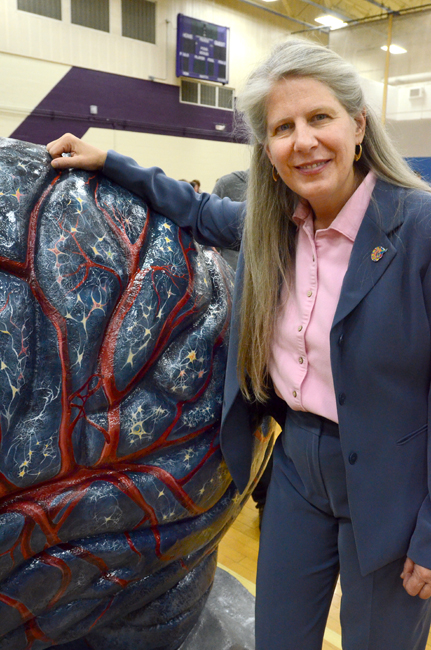
by PETER DORFMAN
Neuroanatomist, author, and TED Talk luminary Jill Bolte Taylor is sheltering in place at her lakeside home in Bloomington. She has the usual mundane concerns in isolation. “Last week I cleaned out the lower level of my house,” she says. “This week I’m cleaning out my garage. It’s actually very satisfying.”
But it’s not all downtime for Taylor, 61, whose 2006 book My Stroke of Insight: A Brain Scientist’s Personal Journey was a best seller. She has a contract with Hay House for a second book, which she hopes to have finished by the end of June for release next spring.
“I’m busy writing, but I’m also doing a lot of media interviews,” she notes. “I get several calls a week from reporters, just to talk about the brain and anxiety.”
In her first book, Taylor wrote about what she calls “the 90 Second Rule”—an attack of anger or anxiety that throws us for a roughly 90-second emotional loop.
“There are three things going on in the brain at any moment: We think thoughts, we feel emotions, and we have a physiological response to what we are thinking and feeling. I might think about a person, and every time I do, I get angry. The thought triggers my anger circuit; I release noradrenaline into my bloodstream, it floods through me and then flushes out in a little less than 90 seconds.”
Taylor’s second book builds on what she learned from the experience of losing one hemisphere of her brain as a result of a stroke (the subject of her 2008 TED Talk).
“In each individual’s brain, there are not just two hemispheres but two cognitive minds,” she says. “The right and left brains process information separately and differently. But in addition to the cognitive minds, we also have two different emotional, limbic minds—two different groups of cells that complement one another, one responsible for the emotions associated with past and future, and the other for the here and now. My second book is about how these four different minds are integrated in the brain to manifest as your unique character.”
She also is keeping up on the research into COVID-19. “I’m very interested in what the coronavirus is doing to its hosts at the cellular level,” she says. “I’ve been exploring—with scientists who are nontraditional thinkers—the behavior and structure of the virus, to look for ways to detect it and possibly denature its structure to destroy it.”
Taylor has an assistant, but she does get out to shop and exercise. She walks, bikes around her neighborhood, rows, and hydrobikes.
“I’ve been wearing a mask and isolating since February,” she says. “This is a natural event, one you would expect to happen eventually. I’ve been paying attention and I’ve been living cautiously. We will get the virus under control; we just have to be careful about the people who lose patience, and get money to the people who need it so desperate people won’t do desperate things.”










